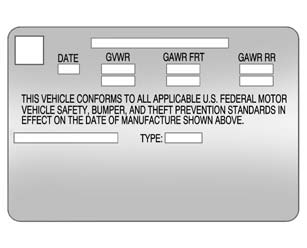Chevrolet Sonic Owner's Manual: Certification Label

Label Example
A vehicle-specific Certification label is attached to the vehicle's center pillar (B-pillar). The label tells the gross weight capacity of the vehicle, called the Gross Vehicle Weight Rating (GVWR). The GVWR includes the weight of the vehicle, all occupants, fuel, and cargo. Never exceed the GVWR for the vehicle, or the Gross Axle Weight Rating (GAWR) for either the front or rear axle.
And, if there is a heavy load, it should be spread out. See ÔÇťSteps for Determining Correct Load LimitÔÇŁ earlier in this section.
Warning
Do not load the vehicle any heavier than the Gross Vehicle Weight Rating (GVWR), or either the maximum front or rear Gross Axle Weight Rating (GAWR). This can cause systems to break and change the way the vehicle handles. This could cause loss of control and a crash. Overloading can also shorten the life of the vehicle.
If you put things inside the vehicleÔÇölike suitcases, tools, packages, or anything elseÔÇöthey will go as fast as the vehicle goes. If you have to stop or turn quickly, or if there is a crash, they will keep going.
Warning
Things inside the vehicle can strike and injure people in a sudden stop or turn, or in a crash.
- . Put things in the cargo area of the vehicle. In the cargo area, put them as far forward as possible. Try to spread the weight evenly.
- . Never stack heavier things, like suitcases, inside the vehicle so that some of them are above the tops of the seats.
- . Do not leave an unsecured child restraint in the vehicle.
- . Secure loose items in the vehicle.
- . Do not leave a seat folded down unless needed.
 Steps for Determining Correct Load Limit
Steps for Determining Correct Load Limit
1. Locate the statement "The combined weight of occupants and cargo should never
exceed XXX kg or XXX lbs." on your vehicleÔÇÖs placard.
2. Determine the combined weight of the driver and ...
Other materials:
Instrument Panel Outer Air Outlet Replacement - Right Side
Instrument Panel Outer Air Outlet Replacement - Right Side
Callout
Component Name
Preliminary Procedure
Remove the right instrument panel upper trim panel. Refer to Instrument
Panel Upper Trim Panel Replacement - Right Side ...
Drive Range, First Gear Engine Braking (Gen 1)
When the gear selector lever is moved to the Drive (D) range from the Neutral
(N) position, the transmission will provide engine braking. In this operating range,
the normally-low 1234 pressure control solenoid 5 is commanded ON and, in the engine
braking mode, the following changes occur with ...
Lift Plate and Holding Fixture Removal
Lift Plate and Holding Fixture Removal
Callout
Component Name
1
DT-46625 Transmission Holding Fixture
For equivalent regional tools, refer to Special
Tools.
Note: Raise the transmission in order to remov ...
0.0057

